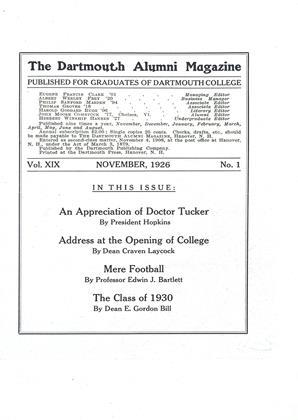President Tucker was the greatest man I have ever known.
The scope of his vision, the balance of his thinking, the interpretive genius of his mind and the courage of conviction which always dominated action on his part were common denominators the significance of which would have been the same in any work for which he might have assumed responsibility.
What he did at Dartmouth was but illustrative of what would have happened in any field of activity to which he might have pledged his interest and support. His work had been distinctive in the Christian ministry, later the influence of his scholarship and character had spread his fame as a great teacher. Finally he assumed almost impossible burdens in official responsibility and self sacrificing toil in connection with rebuilding the college which he loved.
His was no instance of opportunity's making the man. He made opportunities and then so thought and strove and accomplished that these yielded the greatest possible results.
The measure of success of a college administration can never be accurately measured during its period of tenure nor can the quality of its wisdom be surely known. But in regard to President Tucker's administration full and enduring knowledge is available.
The Dartmouth of today is the direct and logical consequence of his thought and work. In his imagination he visualized the superstructure which might be built and sometimes longed for part in building it but meanwhile he laid foundations deep and strong and outlined the wide dimensions of the structure yet to be built.
Finally a tired body refused longer to obey the dictates of a mind which gave no respite, and for nearly two decades since he has literally borne the burdens of which he relieved the College.
More than can be said of the work of any other man in Dartmouth's long history the College of today is his. He loved it so greatly, he believed in it so completely, and he gave to it so freely that the response it made and the momentum it acquired were as his faith had made him see it.
The physical end of a great life can never fail to carry sense of tragedy. I grieve and have sorrow and sense of bereavement that what men call "death" has come to one who was always great and always dear to me. More, nevertheless, I rejoice that he has lived and still lives in the work and in the accomplishment of Dartmouth College and in the lives of thousands of its men who felt and responded to his influence.
Through the courtesy of Mrs. Frank H. Dixon, of Princeton, N. J., a daughter of Dr. Tucker, the ALUMNI MAGAZINE is enabled also to print the following telegram received by her from President Hibben, of Princeton, and a letter from Dr. Henry van Dyke.
Mrs. Hibben and I send our affectionate sympathy to you in the loss of your distinguished father. His services to the cause of education and to the upbuilding of the young manhood of the nation have been of incalculable value, and in the midst of your sorrow you must experience a solemn joy and pride in your heritage.
JOHN GRIEK HIBBEN
Princeton, N. J September 30, 1926.
Dear Madam: I have just read the news of your dear and honored father's death. Will you pardon the liberty I take in writing to express my sorrow and sympathy.
Dr. William J. Tucker was one of the finest men and best Christians that I have ever known. To me he seemed the ideal type of American man. His mental power made him eminent, his devotion to duty made him useful, his warm humanity made him beloved. He would have adorned any station in life and been the delight of any company. His public fame did not spoil his generous, gracious manhood. Those who knew him best loved him most.
I think his children's grief today must be full of a grateful pride in having such a father,—now in peace, beyond the touch of time. Very sincerely yours, HENRY VAN DYKE.
 View Full Issue
View Full Issue
More From This Issue
-
 Sports
SportsMERE FOOTBALL
November 1926 By Professor Edwin J. Bartlett '72 -
 Lettter from the Editor
Lettter from the EditorEditorial Comment
November 1926 -
 Class Notes
Class NotesCLASS OF 1921
November 1926 By Herrick Brown -
 Class Notes
Class NotesCLASS OF 1911
November 1926 By Prof. Nathaniel G. -
 Article
ArticleTHE CLASS OF 1930
November 1926 By E. Gordon Bill -
 Class Notes
Class NotesCLASS OF 1917
November 1926 By Ralph Sanborn







